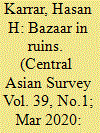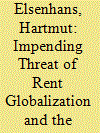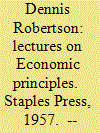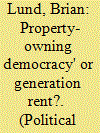|
|
|
Sort Order |
|
|
|
Items / Page
|
|
|
|
|
|
|
| Srl | Item |
| 1 |
ID:
171128


|
|
|
|
|
| Summary/Abstract |
Since 2013, there have been multiple fires in bazaars in Almaty, Kazakhstan. Most of these fires have occurred in Barakholka, the largest bazaar in Central Asia, known for wholesaling in apparel, shoes and low-quality household and office supplies. Ownership of Barakholka is opaque. Using recurrent Barakholka fires as my point of departure, this article contributes to scholarship by describing how the clearing of old bazaars is followed by new property developments and the imposition of new rent regimes. In doing so, I argue that fire – a form of ruination that not only destroys property but also severs networks and people's relationship to a place – is illustrative of how the bazaar, as a new institution within an emerging post-Soviet market economy, was moulded by private interests, and repeated, often ruinous assertions of control over property. I also argue that this process was embedded in a larger political economy that sought to ‘civilize’ the earlier marketplaces. This article is based on ethnographic interviews and repeated visits to the Barakhola between 2016 and 2018, and media accounts of the fires.
|
|
|
|
|
|
|
|
|
|
|
|
|
|
|
|
| 2 |
ID:
186427


|
|
|
|
|
| Summary/Abstract |
This paper uses household survey data from Australia to investigate whether renters face larger energy bills than otherwise similar households. We find that a negative unconditional effect of renting on residential electricity expenditure becomes positive when controlling for log net wealth, with renters on average spending about 8% more than otherwise similar households. This is a larger effect than in most prior studies. The effect operates via higher usage quantities rather than higher average prices, and a similar effect is found for overall residential energy expenditure including natural gas. Central to the story is that renters tend to have lower net wealth, and net wealth is associated with higher energy use due to reasons including additional appliance ownership. This makes net wealth an important control. The findings cast light on the potential for more ambitious policy responses to reduce energy-related disadvantages faced by renters in Australia. There is also scope for further research into whether similarly large effects are evident in other countries.
|
|
|
|
|
|
|
|
|
|
|
|
|
|
|
|
| 3 |
ID:
167047


|
|
|
|
|
| Summary/Abstract |
It is wrong that globalization necessarily leads to a world system where all participating economies are capitalist economies. Under the prevailing conditions of disempowerment of labour, capitalism is too weak to transform rent-based underdeveloped economies. Globalization is driven by currency devaluation, which transforms new comparative advantage into cost competitiveness. The major check on devaluation is full employment. It is often not achieved in countries engaging in devaluation-driven exports. In order to globalize capitalism, labour in the South would have to be empowered. At the theoretical level, a neoliberal understanding of capitalism as against Keynesianism blocks an understanding of the importance of mass consumption for maintaining capitalism. At the political level, mass movements where they exist in the South are captured by secular nationalism or cultural nationalism. An increasingly fragmented multipolar system emerges where governments promote rent seeking.
|
|
|
|
|
|
|
|
|
|
|
|
|
|
|
|
| 4 |
ID:
041079


|
|
|
|
|
| Publication |
Staples Press, 1957.
|
| Description |
480p.
|
|
|
|
|
|
|
|
|
|
|
|
Copies: C:1/I:0,R:0,Q:0
Circulation
| Accession# | Call# | Current Location | Status | Policy | Location |
| 011167 | 330.01/ROB 011167 | Main | On Shelf | General | |
|
|
|
|
| 5 |
ID:
122466


|
|
|
|
|
| Publication |
2013.
|
| Summary/Abstract |
A property owning democracy' has been at the centre of Conservative Party social policy since Noel Skelton coined the phrase in 1924. The idea has been underpinned by contrasting the independent, hygienic, suburban homeowner with the urban, managed, flat-dwelling, high-density council tenant. No Conservative-led government has left office with a homeownership rate lower than when it came to power and the right to buy has enabled this growth to be maintained. However, in 2005, homeownership started to decline and this drop has continued into the Coalition government's term of office with more households now exiting owner-occupation into the private landlord sector than entering owner-occupation from private renting. The 'reinvigorating' the right to buy is an attempt put a 'property owning democracy' back on track but, should it fail, the Conservative Party may turn to more radical policies such as sale on vacant possession of 'high value' local authority and housing association houses.
|
|
|
|
|
|
|
|
|
|
|
|
|
|
|
|
| 6 |
ID:
152085


|
|
|
|
|
| Summary/Abstract |
This paper explores the relationship between ground rent, production and knowledge in Ecuador’s neo-structuralist, state-led project to transform the productive matrix. Based upon insights from the Marxian approach to the critique of political economy, we interrogate how neo-structuralism has conceptualised the relationship between ‘natural resource income’ and ‘knowledge-based’ economic development. The paper argues that a rent-theoretical perspective, which takes seriously the regional unfolding of uneven geographical development in Latin America, can highlight the limits of a national development plan conceived according to the logic of Schumpeterian efficiency. In doing so, the paper identifies the contradictory relationship between natural resource exports, state-led ‘knowledge’-based development and capital accumulation. On this basis the paper offers a historically and empirically informed critical analysis of selective import substitution industrialisation and vanguard science and technology strategies designed to transition Ecuador away from primary resource dependence.
|
|
|
|
|
|
|
|
|
|
|
|
|
|
|
|
| 7 |
ID:
180617


|
|
|
|
|
| Summary/Abstract |
The Lushais maintained commercial contact with the surrounding plains traders in the eighteenth and nineteenth century. The British administrators recognised the importance of trade and bazaar in relation with independent Lushai chiefs and to use them as a diplomatic tool to influence the behaviour of the Lushais. The British introduced riverine bazaars in the interiors of Lushai hills to satisfy Lushais’ desire for tradable commodities; to facilitate the interests of plain merchants in a profitable rubber trade; and to provide security to their subjects within their territories. The failure on the part of the Lushai chiefs to provide security to the marketplaces and resumption of raids in the British territories paved the way for the British to directly interfere in the Lushai affairs. This paper contradicts the Romantic notion of Lushai village communities being self-supporting and isolated autarchy and the notion of self-sufficiency of ‘Indian village communities’ as propagated in the nineteenth century.
|
|
|
|
|
|
|
|
|
|
|
|
|
|
|
|
|
|
|
|
|